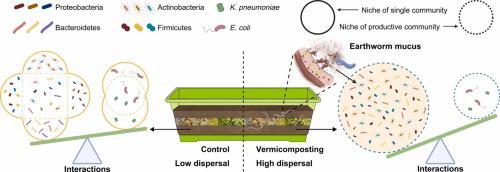当前位置:
X-MOL 学术
›
J. Hazard. Mater.
›
论文详情
Our official English website, www.x-mol.net, welcomes your feedback! (Note: you will need to create a separate account there.)
Bacterial dispersal enhances the elimination of active fecal coliforms during vermicomposting of fruit and vegetable wastes: The overlooked role of earthworm mucus
Journal of Hazardous Materials ( IF 13.6 ) Pub Date : 2024-04-15 , DOI: 10.1016/j.jhazmat.2024.134280 Zihao Duan , Kui Huang , Wenqi Huang , Bangchi Wang , Jiwei Shi , Hui Xia , Fusheng Li
Journal of Hazardous Materials ( IF 13.6 ) Pub Date : 2024-04-15 , DOI: 10.1016/j.jhazmat.2024.134280 Zihao Duan , Kui Huang , Wenqi Huang , Bangchi Wang , Jiwei Shi , Hui Xia , Fusheng Li

|
Earthworms play a pivotal role in the elimination of fecal coliforms during vermicomposting of fruit and vegetable waste (FVWs). However, the specific mechanisms underlying the action of earthworm mucus remain unclear. This study investigated the mechanisms of fecal coliform reduction related to earthworm mucus during FVWs vermicomposting by comparing treatments with and without earthworms. The results show that the secretion of earthworm mucus decreased by 13.93 % during the startup phase, but significantly ( < 0.001) increased by 57.80 % during the degradation phase. Compared to the control without earthworms, vermicomposting led to a significant ( < 0.05) 1.22 −fold increase in the population of active bacteria, with a strong positive correlation between mucus characteristics and dominant bacterial phyla. As the dominant fecal coliforms, and significantly ( < 0.05) declined by 86.20 % and 93.38 %, respectively, in the vermi-reactor relative to the control. Bacterial dispersal limitation served as a key factor constraining the elimination of ( = 0.73, < 0.01) and ( = 0.77, < 0.001) during vermicomposting. This study suggests that earthworm mucus increases the active bacterial abundance and cooperation by weakening the bacterial dispersal limitation, thus intensifying competition and antagonism between fecal coliforms and other bacteria.
中文翻译:

水果和蔬菜废物堆肥过程中,细菌扩散增强了活性粪大肠菌群的消除:蚯蚓粘液被忽视的作用
在水果和蔬菜废物(FVW)的蚯蚓堆肥过程中,蚯蚓在消除粪便大肠菌群方面发挥着关键作用。然而,蚯蚓粘液作用的具体机制仍不清楚。本研究通过比较有和没有蚯蚓的处理,研究了 FVW 蚯蚓堆肥过程中与蚯蚓粘液相关的粪便大肠菌群减少的机制。结果表明,蚯蚓粘液分泌量在启动阶段减少了13.93%,但在降解阶段显着(<0.001)增加了57.80%。与没有蚯蚓的对照相比,蚯蚓堆肥导致活性细菌数量显着增加(<0.05)1.22倍,粘液特征与优势细菌门之间呈强正相关。作为主要粪便大肠菌群,与对照相比,在蠕虫反应器中, 和 分别显着下降(< 0.05),分别为 86.20 % 和 93.38 %。细菌扩散限制是限制蚯蚓堆肥过程中(= 0.73,< 0.01)和(= 0.77,< 0.001)消除的关键因素。这项研究表明,蚯蚓粘液通过削弱细菌扩散限制来增加活性细菌的丰度和合作,从而加剧粪大肠菌群与其他细菌之间的竞争和对抗。
更新日期:2024-04-15
中文翻译:

水果和蔬菜废物堆肥过程中,细菌扩散增强了活性粪大肠菌群的消除:蚯蚓粘液被忽视的作用
在水果和蔬菜废物(FVW)的蚯蚓堆肥过程中,蚯蚓在消除粪便大肠菌群方面发挥着关键作用。然而,蚯蚓粘液作用的具体机制仍不清楚。本研究通过比较有和没有蚯蚓的处理,研究了 FVW 蚯蚓堆肥过程中与蚯蚓粘液相关的粪便大肠菌群减少的机制。结果表明,蚯蚓粘液分泌量在启动阶段减少了13.93%,但在降解阶段显着(<0.001)增加了57.80%。与没有蚯蚓的对照相比,蚯蚓堆肥导致活性细菌数量显着增加(<0.05)1.22倍,粘液特征与优势细菌门之间呈强正相关。作为主要粪便大肠菌群,与对照相比,在蠕虫反应器中, 和 分别显着下降(< 0.05),分别为 86.20 % 和 93.38 %。细菌扩散限制是限制蚯蚓堆肥过程中(= 0.73,< 0.01)和(= 0.77,< 0.001)消除的关键因素。这项研究表明,蚯蚓粘液通过削弱细菌扩散限制来增加活性细菌的丰度和合作,从而加剧粪大肠菌群与其他细菌之间的竞争和对抗。



























 京公网安备 11010802027423号
京公网安备 11010802027423号